Feast of Feasts
Advent, Christmas, and Epiphany
with St. Francis
Menu Links
Contact Us
18 East 34th Street
Savannah, Georgia 31401
Advent 4 – Peace
Peace is a complex term in the Franciscan sense. Francis understood peace more in the Hebrew sense of Shalom. But shalom implies more than lack of conflict. Shalom means completeness, soundness, welfare, and peace. It can also be translated as “success,” and is used in that way as part of a blessing in 1 Chronicles 12:18. In its most straightforward sense, shalom refers to an external peace between two entities—such as individuals or nations—and to an internal sense of peace within the individual.
God’s peace does not come to us easily. It is the kind of peace that lasts and was shown to us in the life of Jesus— His ministry, death, and resurrection. The entire aim of the ministry of Jesus was to establish a community so convinced they were beloved of God, they couldn’t help but proclaim to others that they were beloved as well.
As former Third Order Franciscan, Archbishop Desmond Tutu, said, “Do your little bit of good where you are; it’s those little bits of good put together that overwhelm the world.”
And in doing your “little bits of good” on a regular basis, you will not only grow more peaceful within, but the world, itself, will also become a little bit more peaceful.
Sunday – A Franciscan Story
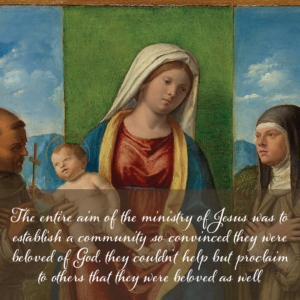 To the medieval way of thinking, Muslims were “unbelieving profaners of the Holy Places.” Even the popes at the time called them “enemies of the Cross of Christ,” “dogs,” “the most wicked lot of warriors,” “a wicked people,” and worse. And it was these popes along with bishops that inflamed the zeal of Christians to take part in Crusades to defeat this enemy.
To the medieval way of thinking, Muslims were “unbelieving profaners of the Holy Places.” Even the popes at the time called them “enemies of the Cross of Christ,” “dogs,” “the most wicked lot of warriors,” “a wicked people,” and worse. And it was these popes along with bishops that inflamed the zeal of Christians to take part in Crusades to defeat this enemy.This way of thinking was unfathomable to Saint Francis who saw in the Muslims he met not merely an opportunity for evangelism. He knew them as brothers, redeemed by the Blood of Jesus, and called to share in God’s Kingdom. More importantly, he considered warfare diametrically opposed to the teachings of Jesus, who had treated humans with love and saved them by giving himself on the Cross.
So, Francis set out for the Crusades and the siege of Damietta, an Egyptian port city on the Mediterranean Sea into which the Nile flows. There, Sultan Melek el-Kamil was encamped across the Nile. Francis arranged to meet with him. As a chronicler at the time wrote:
“The Sultan not only dismissed Francis in peace, with wonder and admiration for the man’s unusual qualities, but also received him fully into his favor, gave him a self-conduct by which he might go and come, with full permission to preach to his subjects, and an entreaty that he would frequently return to visit him.”
Francis learned that a peaceful, humble, and courageous affirmation of the Christian faith—without causing offense to the conscience of the Muslims—could be respectfully heard in Muslim circles. And, while he was able neither to convert them nor to give his life as a martyr in so trying, he yet returned to Italy having won their respect.
Questions for reflection
Have you ever used a peaceful demeanor to ward off a potentially bellicose situation? How did the person or persons react when you refused to get angry?
How about a time, in hindsight, that using kind words and refusing to get ruffled would have produced a better result?
Monday – A Prayer
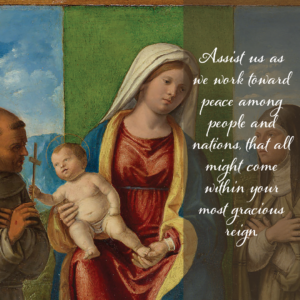 Eternal God, as our Savior Jesus spoke a word of peace to calm a storm, so give us that peace that the world can not give that while we are proclaiming peace with our lips, we might have it even more fully in our hearts. Assist us as we work toward peace among people and nations, that all might come within your most gracious reign. This we ask in the name of the King of Glory, the King of Peace, who lives and reigns with you and the Holy Spirit, one God for ever and ever. Amen.
Eternal God, as our Savior Jesus spoke a word of peace to calm a storm, so give us that peace that the world can not give that while we are proclaiming peace with our lips, we might have it even more fully in our hearts. Assist us as we work toward peace among people and nations, that all might come within your most gracious reign. This we ask in the name of the King of Glory, the King of Peace, who lives and reigns with you and the Holy Spirit, one God for ever and ever. Amen.
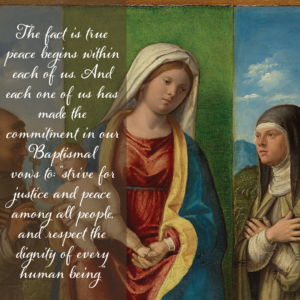 Ever since I was a little girl I’ve aspired to a sense of inner peace and calm. Perhaps it was because my father could get violent when he was drunk. It didn’t happen all the time, but when it did, it was memorable and none of us were spared his fury.
Ever since I was a little girl I’ve aspired to a sense of inner peace and calm. Perhaps it was because my father could get violent when he was drunk. It didn’t happen all the time, but when it did, it was memorable and none of us were spared his fury.But to temper that, among the things my mother would do is read us The Cherry Tree Carol during Advent. I loved the story and how calm Mary stayed in the face of Joseph’s jealousy and anger:
Joseph and Mary walked
Through an orchard green,
Where was cherries and berries
As thick as might be seen.O then bespoke Mary,
So meek and so mild,
“Pluck me one cherry, Joseph,
For I am with child.”O then bespoke Joseph,
With words most unkind,
“Let him pluck thee a cherry
Who is father to thy child.”Mary looked at Joseph
And Mary hung her head,
“All I wanted, Joseph,
Is one cherry red.”We also had a stone statue of Mary in a little wooden triptych which I loved. There was something about unhooking the doors and opening them to reveal inside the little statue of Mary standing in her niche. The scent of the stone and old wood remains with me to this day. And, of course, I saw many paintings of Mary as I was growing up. It was the sense of calm and acceptance that Mary projected that I wanted to embody.
In the Principles of the Third Order, Day Twenty-Eight – The Third Note: Joy says at one point, “We carry within us an inner peace and happiness which others may perceive, even if they do not know its source.” This is one of the many reasons the Third Order of Saint Francis appeals to me.
Yet, inner peace is not easily acquired. It is a long journey, a continual process of letting go—of letting go of anger, of hatred, of anxiety, of unforgiveness, of jealousy, of guilt, of shame…the list goes on, depending on what one needs to shed.
The fact is true peace begins within each of us. And each one of us has made the commitment in our Baptismal vows to: “strive for justice and peace among all people, and respect the dignity of every human being.”
But, as Paul said in Philippians 4:6-7, “Do not worry about anything, but in everything by prayer and supplication with thanksgiving let your requests be made known to God. And the peace of God, which surpasses all understanding, will guard your hearts and your minds in Christ Jesus.”
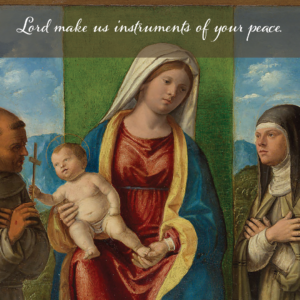 Lord make us instruments of your peace.
Lord make us instruments of your peace.
Help us to recognize the evil latent in a communication that does not build communion.
Help us to remove the venom from our judgments.
Help us to speak about others as our brothers and sisters.
You are faithful and trustworthy;
May our words be seeds of goodness for the world:
Where there is shouting, let us practice listening;
Where there is confusion, let us inspire harmony;
Where there is ambiguity, let us bring clarity;
Where there is exclusion, let us offer solidarity;
Where there is sensationalism, let us use sobriety;
Where there is superficiality, let us raise real questions;
Where there is prejudice, let us awaken trust;
Where there is hostility, let us bring respect;
Where there is falsehood, let us bring truth. Amen.-Pope Francis
Questions for reflection
Read back through Pope Francis’ re-working of the Prayer of Saint Francis, and starting with the second line, think of a time when you believed something you read on social media and believed it without checking the facts.
What about a time when you judged someone harshly without trying to put yourself in their shoes?
Have you shouted when you should have listened?
Excluded someone instead of including them?Do you lean more toward being an instrument of God’s peace or sowing dissension?
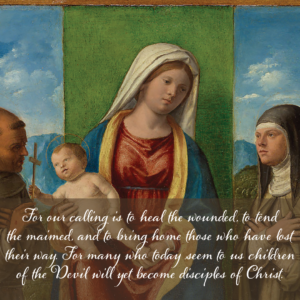 Saint Francis taught his fellow friars to use the greeting, “The Lord give you peace!”
Saint Francis taught his fellow friars to use the greeting, “The Lord give you peace!”“When you proclaim peace by your words,” he said, “you must carry an even greater peace in your hearts. Let no one be provoked to anger by you, or be scandalized, but let your gentleness encourage all men to peace, good will, and mutual love. For our calling is to heal the wounded, to tend the maimed, and to bring home those who have lost their way. For many who today seem to us children of the Devil will yet become disciples of Christ.”
Francis was mirroring what Jesus says in Matthew 5:21-26, “You have heard that it was said to those of ancient times, ‘You shall not murder,’ and ‘whoever murders shall be liable to judgment.’ But I say to you that if you are angry with a brother or sister, you will be liable to judgment, and if you insult a brother or sister, you will be liable to the council, and if you say, ‘You fool,’ you will be liable to the hell of fire. So when you are offering your gift at the altar, if you remember that your brother or sister has something against you, leave your gift there before the altar and go; first be reconciled to your brother or sister, and then come and offer your gift. Come to terms quickly with your accuser while you are on the way to court with him, or your accuser may hand you over to the judge and the judge to the guard, and you will be thrown into prison. Truly I tell you, you will never get out until you have paid the last penny.”
Questions for reflection
Is there someone with whom you need to make peace? Imagine the faces of those with whom you might need reconciliation. Pray for Jesus to help you come to terms with making peace with this person or persons. Then, try and come up with a realistic plan for doing so. Reconciling with your enemies will bring you much peace.
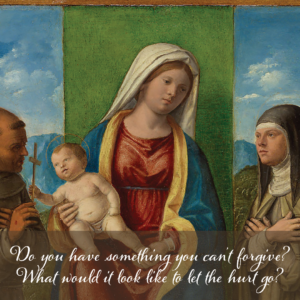 Victoria; our daughter, Griffin; and I were in Israel in 2000 to hike from the Mediterranean to the Sea of Galilee in a trip put together by the Community of the Holy Spirit, an order of Episcopal nuns. We were standing outside on a pleasant spring evening in Galilee as the blue dark sky dimmed toward night when warning sirens sounded an alarm. Everyone at the Kibbutz, where we were spending the night, continued as they were without pause. I asked someone what we were to do. “It’s too late,” he told me. “We can’t make it to a shelter before the bombs land.”
Victoria; our daughter, Griffin; and I were in Israel in 2000 to hike from the Mediterranean to the Sea of Galilee in a trip put together by the Community of the Holy Spirit, an order of Episcopal nuns. We were standing outside on a pleasant spring evening in Galilee as the blue dark sky dimmed toward night when warning sirens sounded an alarm. Everyone at the Kibbutz, where we were spending the night, continued as they were without pause. I asked someone what we were to do. “It’s too late,” he told me. “We can’t make it to a shelter before the bombs land.”Recent attacks had all focused on nearby Kiriath Shimonah, of late, and it remained the presumed target when the sirens blared and loudspeakers directed us to a shelter. The rockets passed over us, and we could hear the distant rumble as the attack hit home right where everyone assumed it would land. And though the Kibbutzim had not been sure of this, they knew they were likely to be spared, and so they went about their lives. If this proved wrong, they would deal with a rocket attack and its aftermath.
Victoria and I returned to Israel on a study trip in Eastertide of 2018. We heard stories from an immigrant from the Bronx who became the spokesperson for Israel during the Second Intifada, when bomb attacks in the street or at weddings and other public events were common occurrences. We met Palestinian refugees in Bethlehem and learned of the desperation of a people wanting their historic homeland back as promised by the United Nations. We met so many people who shared their pains and sorrows, longing for others to understand their plight.
Generation after generation of pain and suffering is layered on the people who live where Jesus called on people to love their neighbors as themselves. The agape love that Jesus proclaimed means not seeking an eye for an eye, which seems too high a cost to pay after decades of killings. We came to see how distant the hope of peace is for the Holy Land.
The cost of unforgiveness is that peace eludes us in our lives and in our world, and so, we stack up more trauma on trauma. How many generations of Ukrainians will hold the unbearable sorrow of the war of this year? How many generations of children growing up in the crime-plagued neighborhoods of our country will find the camaraderie of a gang the only compelling alternative for community?
Jesus can bring true peace to the world, but only if we are ready to set aside the deep pain of generations of harm to offer forgiveness when crying out for vengeance is the natural human response. There have been hopeful exceptions, like the Truth and Reconciliation process in South Africa as Apartheid ended, but these are all too rare. But, as in that example, the answer cannot be imposed from the outside. Peace must come from within those in the conflict.
Questions for reflection
Do you have something you can’t forgive?
What would it look like to let the hurt go?
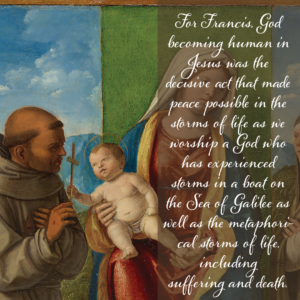 There are moments in life that suck all of the oxygen out of the air and take hope captive. If we are to speak of peace—that shalom that comes from God alone—we must speak of peace in the storm. For the students, staff, and their families of Marjorie Stoneman Douglas High School in Parkland, Florida, Ash Wednesday 2018 was a day of intense pain. Crosses inscribed in ashes made from the palms raised in Hosannas the previous year were still visible on the heads of some parents as they gathered in fear and confusion outside the school in the immediate aftermath of a shooting that left 17 people dead.
There are moments in life that suck all of the oxygen out of the air and take hope captive. If we are to speak of peace—that shalom that comes from God alone—we must speak of peace in the storm. For the students, staff, and their families of Marjorie Stoneman Douglas High School in Parkland, Florida, Ash Wednesday 2018 was a day of intense pain. Crosses inscribed in ashes made from the palms raised in Hosannas the previous year were still visible on the heads of some parents as they gathered in fear and confusion outside the school in the immediate aftermath of a shooting that left 17 people dead.“For my family and many of the families affected, Lent this year was a visceral experience,” Philip Schentrup, whose daughter Carmen was among those killed, said months later to a gathering at the General Convention of the Episcopal Church in Austin, Texas. He went on to describe that Lent as, “One of loss and lamentation. One of profound sorrow and helplessness.”
Carmen had headed her youth group at St. Mary Magdalene Episcopal Church in Coral Springs, Florida, where she also sang in the choir. Her senseless death understandably brought the family to the edge of despair.
For Francis, God becoming human in Jesus was the decisive act that made peace possible in the storms of life as we worship a God who has experienced storms in a boat on the Sea of Galilee as well as the metaphorical storms of life, including suffering and death. When we say that God will never leave or forsake us, we speak of that same God who in the person of Jesus knew real pain and is with us in the midst of sorrows that seem unbearable.
Philip Schentrup told the gathering in Austin how he had had a moment of inspired reflection after weeks of sorrow, “I understood at that moment that I had it all wrong. Carmen’s murder and acts of much greater violence are not part of God’s plan. God did not intend to inflict deep and lasting damage on my family.”
He went on to say, “God is saddened by Carmen’s murder and all the violence people are allowed to inflict on one another. God weeps for all his children.” He went on to say, “God gave us free will–the ability to do good, to be complacent, to inflict harm. God gave us the prophets, his Son, and the Holy Spirit to show us the way. God wants us all to live into his path of love and kindness. God is waiting for us all to step up.” For Philip and his family, stepping up is advocating for policies that can lessen the chance of massacres like the one that took their daughter.
There are so many storms of life during which we can’t hold on to hope, and peace seems a distant memory. Victoria and I have both experienced this in times of tragedy in our lives, including when each of us lost a brother far too early. The path to peace is to stay in community, or to find your way back to community when you can. Gathering strength from others in worship is powerful, but so too is the still, small voice of God in prayer even when you don’t have the strength to go to church. The sense of being held even in the abyss is real. While peace can seem far off in worship, it is in staying connected in prayer, even in prayers of lament said in hurt and anger, that we stay connected to the one who made us and loves us. In Jesus we can find that peace beyond understanding.
Questions for reflection
Have you been so hurt that you could not go to church? What brought you back?
When have you found peace in loss, even if well after the initial grief?
